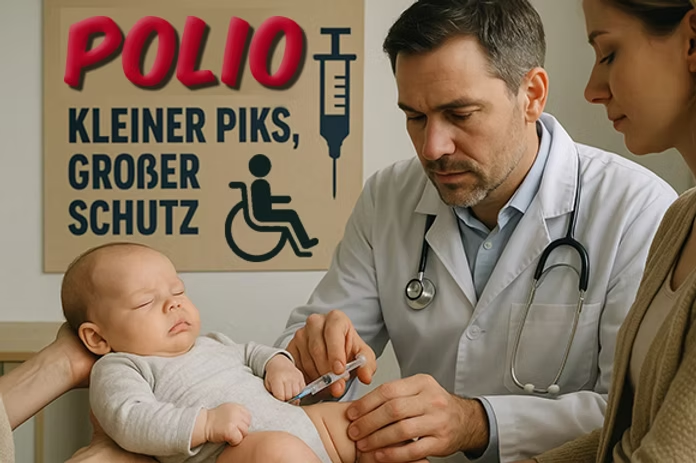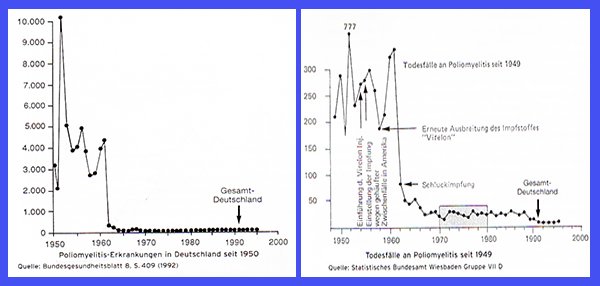by Dr.Harald Wiesendanger– Klartext
What the mainstream media is hiding
Do children still need a polio vaccination today? America’s new Secretary of Health, Robert F. Kennedy Jr., wants to weigh the benefits and risks. His top advisor is calling for the approval to be revoked. Pro-vaxxers are reacting with horror. Is this justified?

No, he has absolutely nothing against vaccinations in principle, Robert F. Kennedy asserted on January 29 at the Senate hearing on which his appointment as America’s new Secretary of Health and Human Services depended. He is simply committed to examining each vaccine individually to weigh the benefits and risks. Why? So that parents can give truly “informed consent” to their child’s vaccinations in the first place. “Mr. Kennedy has long said he wants transparency around vaccines and wants to give people a choice,” explained his spokeswoman, Katie Miller.
Kennedy’s ambitious fact-checking exercise is also expected to include polio vaccines. After all, Kennedy’s top advisor, attorney Aaron Siri, had already petitioned America’s top drug regulator, the FDA, in 2022 to revoke approval of the polio vakzins – as well as the vaccines for hepatitis B and 12 other vakzins. (The FDA has been “reviewing” this application for three years.) Siri, who specializes in vaccine litigation, submitted his polio petition on behalf of the nonprofit Informed Consent Action Network (ICAN); its founder, the highly anti-vaccine television and film producer Del Bigtree, is also close to Kennedy, as the New York Times reported. Siri was involved in interviewing and selecting candidates for top positions at the Department of Health and Human Services. Siri had already assisted Kennedy during his own presidential campaign. He was considered the most promising candidate for the highest legal position in the Department of Health and Human Services, that of General Counsel. This likely didn’t happen only because Siri believes he can exert more influence outside the administration. At his law firm, Siri & Glimstad, he oversees approximately 40 experts working on vaccine cases and policies. He has helped numerous parents circumvent vaccination regulations. (1) “I love him,” Kennedy raved about Siri in a podcast.
Soon to be “defenseless” again?
Pro-vaxxers are sounding the alarm in horror. Gasping for breath, they warn of a catastrophic mistake that could potentially undo one of the supposedly greatest achievements in medical history. On April 12, 1955, the then US government under President Dwight D. Eisenhower approved the polio vaccine developed by Jonas E. Salk. Before it was available, polio caused 15,000 cases of paralysis each year in the US alone; during a major outbreak in 1952, the number was reportedly 58,000, with over 3,000 deaths. Hospitals were overflowing with disabled or seriously ill patients, according to the National Library of Medicine. Fearful families isolated themselves because the virus spread easily among children. It wasn’t until Salk’s discovery that the turnaround began; the major breakthrough came six years later, when the oral vaccine was introduced, replacing the dreaded needle. Proponents claim that the number of reported polio cases dropped to virtually zero within a very short time. Industrialized nations have long been officially polio-free. However, doctors warn that a suspension of polio vaccinations could contribute to the re-emergence of the dreaded disease. “Millions of people,” the New York Times predicted, would then once again be defenseless against a virus that “can cause paralysis or death.”
Furthermore, Kennedy and Siri themselves must be prepared for resistance in the White House. Donald Trump has also promised to conduct “very serious tests” and to eliminate some vaccines “if I think they are dangerous and not useful,” as he emphasized in an interview with Time magazine. On December 8, 2024, Trump stated on NBC’s “Meet the Press” that he was quite open to a review of vaccines and autism—with one exception: “The polio vaccine is the greatest thing.” If someone tells me I should get rid of the polio vaccine, they’ll have to really try to convince me.” (2)
Is Kennedy now breaking his word? Didn’t he literally affirm during his Senate hearing: “I support the polio vaccine. I support the polio vaccine. I will do nothing as HHS secretary that makes it difficult or discourages people from taking either of those vaccines.”
Are Kennedy and Siri really out of their minds?
Fact check: How justified is the polio scaremongering?
Polio is contracted through the mouth, not the nose. Unlike COVID-19, influenza, measles, tuberculosis, chickenpox, whooping cough, mumps, and rubella, the polio virus is not primarily transmitted through the air. Still, it is mainly ingested orally—particularly through drinking water contaminated with feces containing the wild virus. This means that the most effective measures to contain polio are good drinking water treatment, improved sanitation, and modern hygiene, which makes contact with the wild virus unlikely.
This type of epidemic prevention has been practiced in industrialized nations since the 20th century. And this is precisely why the number of polio cases and deaths declined dramatically long before suitable vaccines were available:

“In most of the civilized world,” medical journalist Bert Ehgartner explains, “contamination with wild polioviruses is now as unlikely as contact with extraterrestrials. Polio did not become extinct in industrialized countries because of vaccination. (…) It is, therefore, completely illogical that a suspension of vaccination would lead to a polio comeback. (…) Is it of any use for the general population? Very little to none.” (3)
Furthermore, the risk of confusion disappeared. Since the end of the 19th century, there were frequent waves of poliomyelitis, in which neurotoxic poisons such as lead acetate and DDT were sprayed extensively. As soon as their use was banned, the official polio figures fell. (4)
Not a single child with polio in this country since 1978
“The last German toddler,” stated Dr. Gerhard Buchwald (1920-2009), a vaccination-critical specialist in pulmonary diseases and internal medicine in the mid-1990s (5), “contracted poliomyelitis in 1978. Since then, there have only been cases of paralysis following the poliomyelitis vaccination.”
This has remained the case to this day: Even in the 21st century, not a single case of poliomyelitis caused by wild viruses has been recorded in Germany. Polioviruses did appear in wastewater samples from several German cities – including Munich, Bonn, Cologne, and Hamburg – in November 2024; however, they presumably originated from migrants from countries where the oral live vaccine is still used. “If no German child has contracted polio since 1978, the question must be legitimate whether vaccination against polio is still necessary at all, because although it leaves few, but particularly serious, vaccine-related injuries,” concluded Dr. Buchwald. “In my opinion, this vaccination can also be postponed until a later age without any concerns. (…) If the polio vaccination truly provides protection, then the vulnerable regions can be vaccinated in the shortest possible time if polio recurs.”
Irresponsible? We take out health and accident insurance, liability insurance, and occupational disability insurance to be prepared for personal disasters—no matter how unlikely they are. Shouldn’t we, to be on the safe side, be just as hypercautious with polio?
We do it because we’ve been instilled with a terrible fear of the polio pathogen, the neurotropic enterovirus. But this fear is extremely exaggerated. 90 to 95% of all cases caused by it are clinically uneventful, with few symptoms, or are completely asymptomatic. One in twenty infected people develops symptoms similar to a flu-like infection; even rarer is aseptic meningitis. Those affected recover within a few days – and are then immune to reinfection for life. Only one in every hundred to one thousand (!) infected people experience the typical symptoms of poliomyelitis, usually in the form of paralyzed limbs. However, in most cases, these symptoms resolve within a year. (6)
Parents should weigh this undisputed residual risk against possible vaccine damage resulting from the polio vaccination. (7) As even its proponents admit, the weakened pathogens in the live vaccine can also cause polio, especially in people with a compromised immune system. Although, according to official sources, this only occurs in about 1 in 2.7 million doses, the oral vaccine has therefore been discontinued in Germany since 1998. It has been replaced by injected inactivated vaccines containing killed pathogens or individual components, some of which may also be artificially produced. In these cases, the Robert Koch Institute (RKI) and the German Institute for Clinical Trials (STIKO) explain that relatively harmless side effects – redness, swelling, or pain at the injection site, fever, and fatigue – occur quite frequently in 5 to 15% of all cases. Allergic reactions – such as rash, shortness of breath, or swelling of the face or tongue – occur in only one in 10,000 vaccinated individuals. (8) Equally rare are severe febrile seizures and a brief shock-like state – a “hypotonic-hyporesponsive episode” (HHE) – in which the child’s muscles relax and they become unresponsive.
But what use is a statistical improbability to my child if it happens 100% of the time in them? After government-mandated mass polio vaccinations began in Germany in 1960 – initially in West Berlin, then throughout Germany – numerous cases of serious vaccine injuries were reported: 25 in vaccinated individuals, 23 in unvaccinated contacts. These included several cases of Guillain-Barré syndrome, encephalomyelitis, and multiple sclerosis, as well as one case each of meningitis and postencephalitic syndrome. (9) In his book, “Vaccination – The Business of Fear,” Gerhard Buchwald presents several tragic cases of children whose lives were forever destroyed by the supposed “vaccine protection.” (10)
There’s more to every vakzine than just the antigen. This applies both to combination vaccines like Infanrix-IPV+Hib, which the German Standing Committee on Vaccination (STIKO) prefers for so-called “primary immunization” in infancy, and to single vaccines like Imovax Polio®, IPV Mérieux®, and Polio vaccine AJV, which are intended more for “boosters” or “catch-up” vaccinations. To date, no one knows what the additives can do to the body in the long term, over the course of several years and decades—especially in hypersensitive or pre-existing patients.
Long story short: In the US, as well as in Germany and the rest of the civilized world, the benefits of a polio vaccination are now approaching zero, while risks persist. And that’s why Kennedy and Siri are quite right to question it, period.
(Harald Wiesendanger)
Notes
(1) https://www.sirillp.com/aaron-siri/; https://www.nytimes.com/2023/12/03/us/politics/mississippi-childhood-vaccine-mandates.html; https://www.sirillp.com/newsmax-aaron-siri-discusses-san-diego-judges-ruling-against-student-vaccine-mandate/
(2) Trump wörtlich: “Hey, look, I’m not against vaccines. The polio vaccine is the greatest thing. If somebody told me to get rid of the polio vaccine, they’re going to have to work real hard to convince me. I think vaccines are — certain vaccines — are incredible.”
(3) Bert Ehgartner: Was Sie schon immer über Impfung wissen wollten (2023), S. 283.
(4) Siehe Forrest Maready: The Moth in the Iron Lung – A Biography of Polio (2018).
(5) Dr. Gerhard Buchwald: Impfen – Das Geschäft mit der Angst, 5. Aufl. 2008, S. 127 f.
(6) Buchwald: Impfen – Das Geschäft mit der Angst, a.a.O., S. 120 ff.
(7) Buchwald, a.a.O, S. 288 ff.
(8) https://www.nali-impfen.de/impfempfehlungen/impfungen-a-z/poliomyelitis-impfung/; https://portal.dimdi.de/amispb/doc/pei/Web/2611894-palde-20140201.pdf; https://www.netdoktor.de/krankheiten/polio/impfung/
(9) Nach P. E. Trüb: Die orale Poliomyelitisschutzimpfung, Düsseldorf 1969.
(10) s. Buchwald, a.a.O., S. 291-303.
Support “Ways Out Charity“! With your support, we can help and move forward. > https://bit.ly/3wuNgdO
